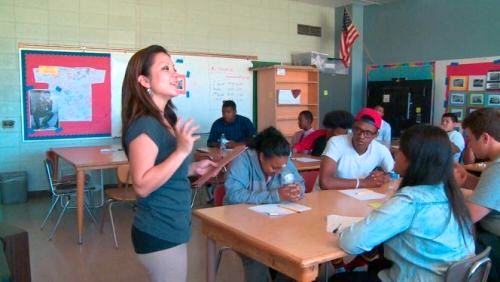Base relocation issue taught in Portland school

Moé Yonamine, a social studies teacher at a high school in Portland, OR, educates her students on Okinawan history and the latest U.S. military base issues.
December 23, 2018 Ryukyu Shimpo
By Yukiyo Zaha, Washington correspondent
Moé Yonamine, a 40-year-old Naha City native, teaches social studies at a high school in Portland, Oregon. She authors online articles and educates her students on aspects of Okinawan history and the latest U.S. military base situation that are often left out of textbooks and the media. Yonamine said she wants to “pass on Okinawa’s lore and history of resistance to the young generation, and together think about how we can change the future of the world.” During winter break, she developed a curriculum on the new military base construction issue in Henoko, Nago City. The curriculum will be shared with her colleagues so they can teach the subject as well.
Yonamine was seven years old when her mother decided to attend graduate school and moved them to the United States. Every summer, Yonamine returned to Okinawa to visit her grandfather Mosai, who is a lawyer. He told stories of how tragic the Battle of Okinawa was, of relatives who lost their lives in the battle and Okinawa’s history under U.S. occupation.
At work, she teaches U.S. History. Her classroom is “like the United Nations,” comprised of students of diverse ethnicities and backgrounds. She said her African American, Hispanic, Native American and Pacific Islander students empathize when she tells the story of Okinawa when teaching about indigenous tribes, their land and rights.
In August, Yonamine and her oldest daughter, 16-year-old Kaiya, participated in a protest that took place in front of a gate of a U.S. base in Henoko. Yonamine felt her tears well up when she witnessed the riot police removing elderly war survivors who were protesting persistently under the beating sun, while rows of trucks drove past them and entered the base.
An elderly woman gently came to her side and said to her, “We don’t cry here. I’ll cry when I get home. We have to stick it out for now.” She squeezed Yonamine’s hand.
“These elderly people experienced a terrible war and now they’re risking their lives to stage sit-ins.” Using Okinawa’s indigenous language, Yonamine said, “Uchinanchus (Okinawans) are chuba (strong). We still have fight in us. We’re in it together, and we want the world to see.”
Although the central government’s decision to proceed with land reclamation work tears at her heart, Yonamine believes that, “when normal people like us stand up for a cause, we can change politics and society.”
(English translation by T&CT and Monica Shingaki)
Previous Article:Former Army Colonel Wilkerson says Marine Corps in Okinawa is “strategically unnecessary”
Next Article:Southern Cross viewing season arrives in Ishigakijima
[Similar Articles]
- Student’s web-available documentary highlights lack of information about Henoko in America
- UN forum Asia delegates declare Japan ignores Okinawans’ indigenous rights in building new base
- South American students visit Okinawa for cultural exchange with the elderly
- Memorial service held in Chibichiri-gama where group suicide occurred during the Battle of Okinawa
- Japanese American organizations select Okinawan for 2014 Women of the Year Award
 Webcam(Kokusai Street)
Webcam(Kokusai Street)


